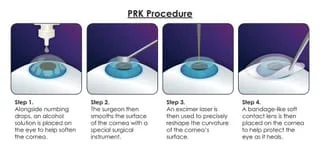PRK: The Original Laser Eye Surgery
PRK was invented in the early '80s. The first FDA approval of a laser for PRK was in 1995, but the procedure was practiced in other countries for years. In fact, many Americans had the surgery done in Canada before it was available in the U.S. PRK is performed with an excimer laser, which uses a cool ultraviolet light beam to precisely remove ("ablate") very tiny bits of tissue from the surface of the cornea in order to reshape it. When you reshape the cornea in the right way, it works better to focus light into the eye and onto the retina, providing clearer vision than before.
Both nearsighted and farsighted people can benefit from PRK. With nearsighted people, the goal is to flatten the too-steep cornea; with farsighted people, a steeper cornea is desired. Also, excimer lasers can correct astigmatism, by smoothing an irregular cornea into a more normal shape.

You may be able to go to work the next day, but many doctors advise a couple of days of rest instead. They also recommend no strenuous exercise for up to a week, since this can traumatize the eye and affect healing.
You will be examined just about every day to make sure the epithelium is healing properly. You will probably wear a special "bandage" contact lens, use antibiotic drops for a few days, and apply anti-inflammatory drops for several weeks.
By about the third day after surgery re-epithelialization has occurred, so the doctor may permit you to remove the contact lenses. Vision will probably not be perfect immediately: in three days many patients do have 20/40 or even 20/20 vision, but others take longer - possibly three or six months - to reach their final result. Usually people can drive in about a week after surgery. These recovery times are significantly longer than with LASIK.
